We may not have the course you’re looking for. If you enquire or give us a call on 01344203999 and speak to our training experts, we may still be able to help with your training requirements.
We ensure quality, budget-alignment, and timely delivery by our expert instructors.
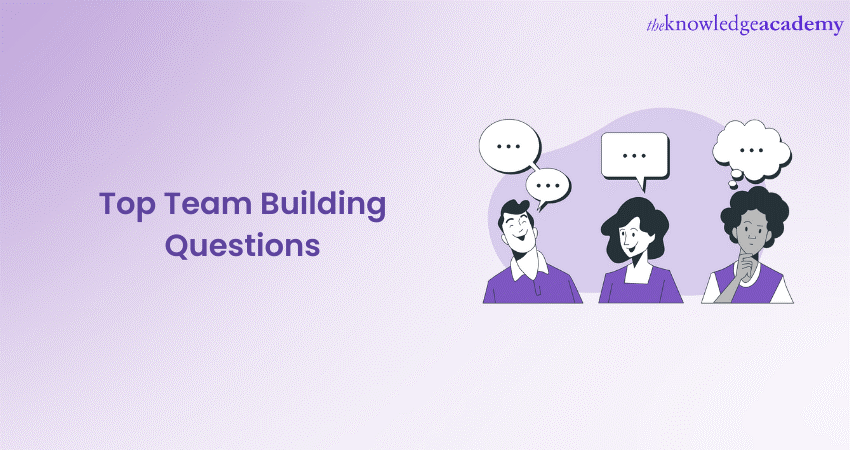
The workplace environment has transformed significantly since the end of the pandemic. As remote work becomes more common and teams grow more diverse, companies are eager to gain deeper insights into their employees. A critical innovation for organizations in this evolving landscape is the adoption of Team Building Questions. These questions have proven to be an effective tool in enhancing understanding and cooperation within teams.
According to TeamStage, teamwork is very important for 37% of the employees. As days go by, the percentage of employees for teamwork has increased. These questions of team building that are asked in interviews help the organisations determine the candidates that they are onboarding. Check out this blog on Team Building Questions. This will help you to learn how to strengthen relationships and develop trust within your team.
Table of Contents
1) General Team Building Questions
2) Innovative Team Building Questions
3) Problem-solving Team Building Questions
4) Leadership and conflict resolution Team Building Questions
5) Role-specific Team Building Questions
6) Team culture and dynamics Team Building Questions
7) Adaptability and change management Questions for Team Building
8) Additional Interview Questions for Team Building
9) Conclusion
General Team Building Questions
Let’s begin discussing the general Team Building Questions that you may face while attending interviews:
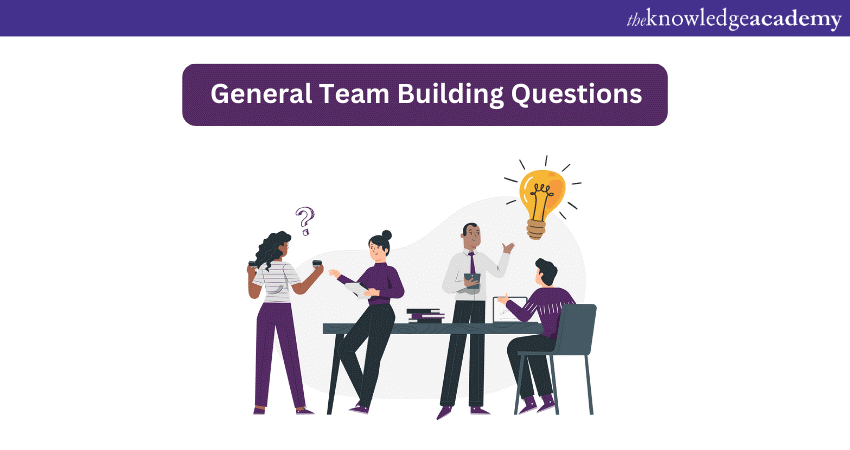
1) What is the commonality of a high-performing team?
Ans: A high-performing team is characterized by its members’ responsiveness to others’ opinions, genuineness, and open-mindedness, while their communication is evidenced by a culture of camaraderie and contribution towards the common goals.
2) Explain how the team event you recall contributes to your academic development and your future
Ans: Team efforts are normally interesting when obstacles experience of working in the teams doing the difficult tasks to achieve the deadline. This brings about a great feeling of being proud because togetherness in the team is elevated.
3) What key values should every team have?
Ans: The main principles that are frequently highlighted in a team environment include belief, responsibility, and openness in communication.
4) What is the major factor that makes you want to be a member of a team?
Ans: Discovering specific drives among the team members and team cooperation leads to a powerful motivation factor.
5) How would you resolve conflicts within your team?
Ans: Conflicts within a team can be resolved through open discussions. This leads to a compromise that combines the best aspects of the opposing proposals.
Ready to elevate your team's performance to new heights? Register in our Team Development Masterclass .
6) What are the effective ways to give feedback within a team?
Ans: Feedback is at its most powerful when it's constructive, focused on the specific aspects to improve and delivered at the right moment and with respect.
7) What role can individuals play within a team to foster a better working environment?
Ans: There may be some team-memebers who will play the role of a mediator contributing towards creating an atmosphere where we all would be heard and get the support that we need.
8) What are the strengths that individuals can bring to a team?
Ans: The individual powers that can turn a member of a team into a competitive force may include ability to make decision in tough situations, uniqueness supported by flexibility in thinking, and optimism.
9) How can stress within a team be managed?
Ans: Stress within a team can be managed through open communication, mindfulness, and setting realistic goals.
10) What impact can team-building activities have on team relationships?
Ans: Regular team-building activities can significantly improve team relationships and understanding.
11) Is there a team you admire? Why?
Ans: The Apollo 11 team is often admired for their pioneering spirit, innovative solutions, and extraordinary teamwork under high-stakes circumstances.
12) How can positive team dynamics be maintained?
Ans: Positive team dynamics can be maintained through open communication, active listening, respect for everyone's perspectives, and offering help when needed.
Innovative Team Building Questions
We are now aware of the general Team Building Questions that will be asked in interviews. To give you a broader perspective on interview questions for team building, we have also prepared some innovation questions for you. Let’s have a look:
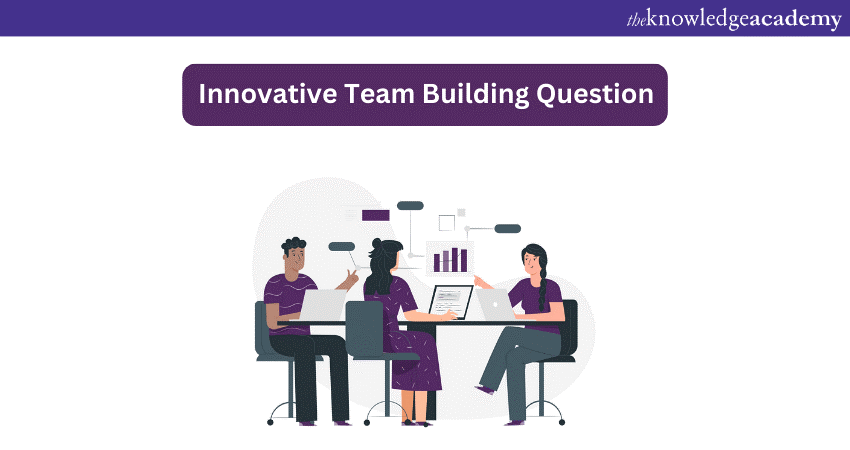
1) If your team were a motion picture, what genre would it be, and what character(s) would it hold?
Ans: We may use the similarity between "The Avengers" movie and the success of a team to show that each member of the team is endowed with unique skills. Together, they will be similar to the "Gifted" squad from the movie in that they can all take care of difficult issues.
2) If you could have any superpower to help your team, what would it be and why?
Ans: Time operating within the confines of superhero powers can be a remarkable asset, guaranteeing deadlines are met at all times.
3) How would spending a day in the shoes of a team leader impact your understanding of team challenges and responsibilities?
Ans: The skills of team leaders can be grasped by exchanging roles that day.
4) What's one innovative thing you would implement for your team's learning and development?
Ans: Implementing a "learning hour" can enhance the collective learning of a team.
5) How could your team use technology to enhance collaboration?
Ans: Collaboration tools can be a creative way of streamlining communication and project management within a team.
6) Describe your team in three words.
Ans: Teams can be described as dynamic, innovative, and supportive.
7) If you had to pick a mascot for your team, what would it be, and what that mascot will represent?
Ans: A phoenix can be emblematic of our team. While Phoenix is a metaphor, the name stands for the team guiding through difficulties with more power they gain by directing themselves from such challenges.
8) What song best represents your team and why?
Ans: "We Will Rock You" by Queen is a great example for the team which is fighting front to front and is ready for any difficulty and all the tasks it has to accomplish masterfully.
9) If resources were no object, what would you do for your team?
Ans: Given unlimited resources, a team could benefit from an international retreat to celebrate accomplishments and build stronger personal connections.
10) What's one team tradition you would love to start?
Ans: A monthly "team spotlight" can serve as a great team tradition. This is where a team member's contributions are appreciated, and more about them is learned.
Boost your leadership potential and excel in team management with our Management Courses.
11) If your team had a uniform, what would it look like?
Ans: A team uniform could be casual and comfortable, with colours representing each team member's unique skills and roles.
12) If you could invent a team holiday, what would it be, and how would you celebrate it?
Ans: A "Team Triumph Day" could be invented as a team holiday to celebrate team achievements. This holiday will feature shared success stories and group outings.
Problem-Solving Team Building Questions
Till this point in the blog, we have got to know some good team building questions for your upcoming interviews. Let us now look at some more problem-solving Team Building Questions:
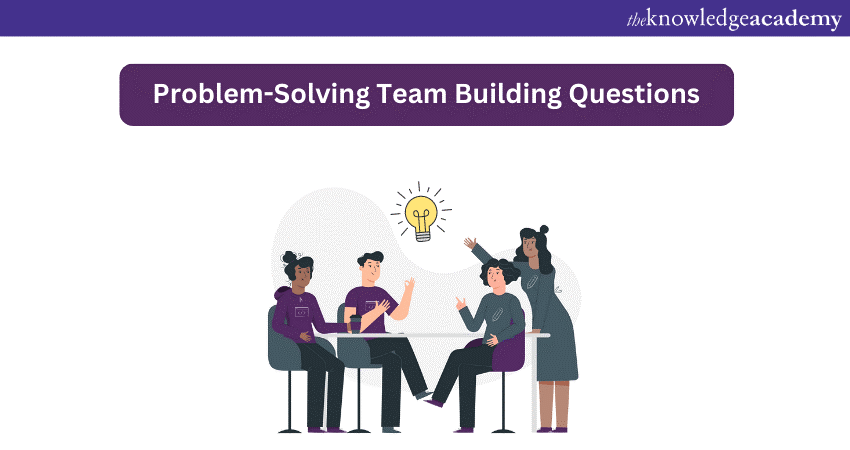
1) How do you solve complex problems within your team?
Ans: Complex problems can be solved through organised brainstorming sessions. This leads to creative and effective solutions.
2) How do you handle a team member who consistently opposes certain ideas?
Ans: Constructive conversations can help find common ground with a team member who consistently opposes certain ideas.
3) Let us assume that you have a particular project that would have taken more time to complete than you had planned; how would you have handled it?
Ans: Trying to complete the project in more than 50% time less than first estimated requires prioritising, rethinking, strategic team task delegation, and directing communication.
4) How do you cultivate ingenious thinking in your team members?
Ans: Brainstorming sessions on a regular basis or creating conditions which support every idea and appreciate the contributions equally foster creative thinking in teams.
5) What types of decision-making draw most on teamwork?
Ans: As a team, you can use a democratic approach in which everybody has a piece to say before the final call is taken.
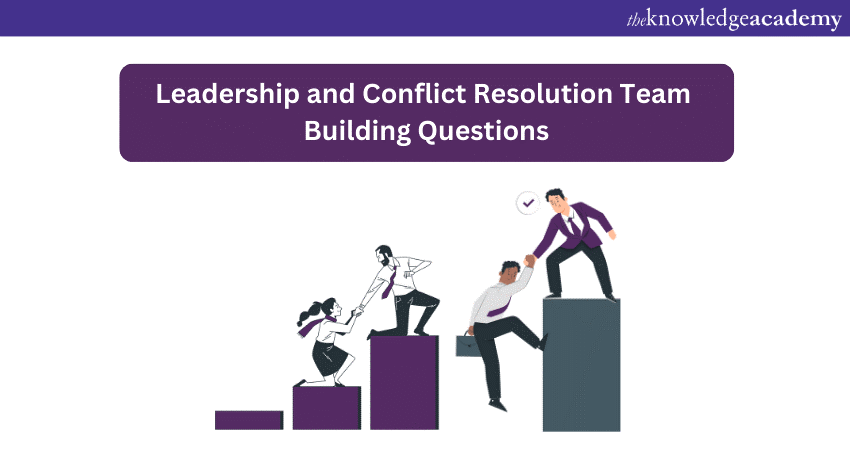
6) What do you do when your team is stuck on a problem?
Ans: Considering from a variety of angles and inviting team members to make unexpected contributions may work wonders when the team feels helpless.
7) It is a very difficult situation. How do you handle a case in which your team's resolution method does not work as expected?
Ans: When a team's solution doesn't deliver the desired result, it's imperative to uncover the cause and try something different rather than repeating the same untried steps again.
8) How do you handle quick pivots in a project?
Ans: Quick pivots in a project may be required due to changing circumstances, such as shifting a product's target demographic midway. This generally occurs due to market research results.
9) How do you handle a situation where a team member's work is not up to standard?
Ans: Constructive feedback and support can help improve a team member's work when it's not up to standard.
10) What do you do when a project that you are actively involved in encounters obstacles or dead-ends?
Ans: The issues that arise in the course of this project can be effectively addressed by multiple group meetings engaged in decision-making, shared learning and on the way to the new solutions.
Step up your management game and lead with confidence by registering for our Introduction To Managing People Course.
11) How do you celebrate when your team has solved a difficult problem?
Ans: Solving a difficult problem can be celebrated by acknowledging everyone's contributions. This is also done by sharing success with stakeholders and organising a small celebration.
12) How do you ensure your team's solutions are sustainable?
Ans: Ensuring solutions which are sustainable involves aligning them with long-term goals and making them adaptable to changing circumstances.
Leadership and conflict resolution Team Building Questions
If the interviewers ask you questions about your leadership abilities, we have prepared some Team Building Questions to help you. As we all know, leadership is a very important aspect of Team Building. The interviewers will try to understand your leadership personality. Let us see how these questions will help you:
1) What are the experiences of the team leaders in terms of leading the group by example?
Ans: Being an example can contain displaying a commitment, showing one's own high level of integrity, communicating directly and in a way understandable, and setting a high bar for working.
2) How do you enter a negotiation process if there is a conflict in the team?
Ans: Internal conflicts in a group can be successfully addressed if they are initially found out and solved based on the dialogue, understanding of the cause and accepting everyone involved.
3) How do you build up shared voluntariness amongst your staff members?
Ans: The intent to facilitate a team member's responsibility could be achieved through defining a groundwork of expectations, presenting fair input and giving credit for the realized goals.
4) What routes do you drive to boost the morale of your team?
Ans: Driving a positive and motivational culture for a team is possible by taking into account respect, effort, and other procedures, as well as by congratulating and being friendly with others.
5) What is the motivation secret for overcoming difficulties in teams?
Ans: Working out how to move the team when times are rough can include listening to and talking to the team, and, at times, giving support. They (mental health professionals) also engage them (mental health patients) by recognizing their efforts and creating an encouraging atmosphere.
6) As a team leader, how would you address the micro managing work to be distributed seeing as success is often equal to cooperation, collaboration and division of labour?
Ans: Buffer tasks and skills in the team by using team members' unique strengths consider in their task assignment. Thus, the principle of fair distribution emerges and guides people on what they should do.
7) What kind of communication style do you take into account in getting along with other team members on the occasion of difficult conversations?
Ans: Creating a dialogue that looks at challenging discussions within a work group entails being understanding, simple, positive, and upholding respect for everyone present.
8) As much as you know how to cope with one team member when he doesn't meet the expectations, how many experiences do you have when dealing with such cases?
Ans: Among different ways of managing a team member who does not perform according to expectations, delivering proper feedback, comprehending their difficulties, and giving support would be efficient
9) What approaches do you consider for the team's goals to align with those of the company?
Ans: By providing a team with clear objectives that will drive the organization towards its aims, different types of communication facilitate maintaining continuity, and regular updates about the business are being done. This will thus demonstrate how the tasks they carry out add up to the bigger overall picture.
10) What strategy do you use to see that team members’ needs are addressed while the team objectives are achieved?
Ans:Individual needs may be served through discovering and having respect for strengths, fostering cohesion and making sure that personal contribution meets common goals.
Be ready to take the next step in your management career- Register for our senior Management Training .
11) What kind of approach do you devise in order to overcome a change in project scope or direction?
Ans:Managing changes either in project scope/direction is ensured through effective communication, flexibility and also making sure that all participants have got what it takes to move along the new agenda.
12) How do you help your team deal with stress and burnout?
Ans: When employees in the team feel that they are experiencing either stress or burnout, the best option for this is to encourage work-life balance. Furthermore, I will get the idea of creating a point of resources for mental health support, and regular breaks to lift up the team members would be just another helping hand.
Role-specific Team Building Questions
You now know how to answer the leadership based Team Building Questions. Now we are going to discuss how to answer the role specific Team Building Questions:
1) How does your role contribute to the team's objectives?
Ans: Understanding how a specific role contributes to the team's objectives can involve outlining the individual responsibilities and demonstrating how they align with team goals.
2) How do you collaborate with others in your role?
Ans: Collaboration in a specific role can involve regular communication, mutual respect, and an understanding of shared goals.
3) How do you handle role-specific challenges?
Ans: Handling role-specific challenges can involve leveraging personal skills, seeking help from colleagues or superiors, and maintaining a solution-oriented mindset.
4) What skills are crucial for your role in the team?
Ans: The skills crucial for a specific role can vary but may involve technical proficiency, strong communication skills, and problem-solving abilities. This may also involve leadership qualities, depending on the role.
5) How does your role align with your personal career goals?
Ans: A role's alignment with personal career goals can be determined by the opportunities it provides for skill development, advancement, and fulfilment of personal aspirations.
6) How do you manage your workload?
Ans: Managing workload can involve effective time management, prioritisation of tasks, and maintaining a balanced approach to work.
7) How do you keep your skills updated in your role?
Ans: Keeping skills updated can involve ongoing learning, attending relevant workshops or seminars, and staying abreast of industry developments.
8) What do you enjoy most about your role?
Ans: Enjoyment in a role can be derived from various aspects, such as the challenge it provides, the opportunity to collaborate with others, or the impact of the work.
9) How do you handle feedback in your role?
Ans: Handling feedback involves being open to constructive criticism, implementing suggestions where applicable, and using feedback as a tool for growth.
10) How do you contribute to a positive team culture in your role?
Ans: Contributing to a positive team culture can involve treating others with respect, helping colleagues when needed, and maintaining a positive attitude.
Master the art of strategic workforce planning with our Workforce Resource Planning Training .
11) How do you navigate role-related conflicts?
Ans: Navigating role-related conflicts can involve open and honest communication, seeking to understand the other person's perspective, and finding a mutually acceptable solution.
12) What strategies do you use to stay motivated in your role?
Ans: Staying motivated in a role can involve setting personal goals, seeking feedback, and finding fulfilment in the work.
Team culture and dynamics Team Building Questions
These skills and abilities are important for you to harbour before you interview for any company. The companies also look for candidates who are tolerant and empathic towards other candidates belonging to different cultures or ethnicity. These are some best team building questions that you can look at before appearing for interviews:
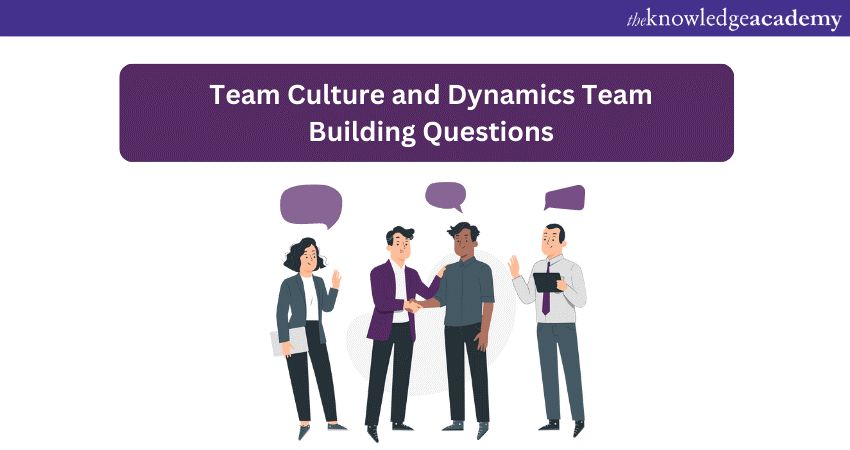
1) What aspects of a team's culture are most important to you?
Ans: The aspects of a team's culture that are most important can vary from individual to individual. However, this may include elements such as open communication, mutual respect, collaboration, and a positive work environment.
2) How do you contribute to a positive team dynamic?
Ans: Contributing to a positive team dynamic can involve clear communication and offering support to team members. This also involves fostering a positive attitude and promoting a collaborative work environment.
3) How do you handle diversity within a team?
Ans: Handling diversity within a team involves respecting and valuing different perspectives. This includes fostering an inclusive work environment and promoting equal opportunities for all team members.
4) How do you foster trust within your team?
Ans: Fostering trust within a team involves consistent honesty, maintaining reliability, being open to feedback, and displaying integrity.
5) How do you handle a team member who isn't contributing equally?
Ans: Handling a team member who isn't contributing equally may involve addressing the issue directly and understanding the root cause. This also includes working together to find a solution.
6) How do you encourage collaboration within your team?
Ans: Encouraging collaboration within a team can involve practising open communication and creating a supportive work environment. This also includes promoting shared goals and objectives.
7) How do you handle personality clashes within your team?
Ans: Handling personality clashes within a team can involve promoting mutual respect, facilitating open dialogue, and mediating conflicts in a fair and impartial manner.
8) How do you promote team spirit?
Ans: Promoting team spirit can involve celebrating team achievements, fostering a positive work environment, and encouraging team activities and bonding sessions.
9) How do you handle a negative attitude within your team?
Ans: Handling a negative attitude within a team can involve addressing the issue directly, providing support, and promoting a positive and constructive work environment.
10) What strategies do you use to manage team performance?
Ans: Managing team performance can involve setting clear expectations, providing regular feedback, acknowledging good performance, and identifying opportunities for improvement.
Foster an inclusive and respectful work environment with our Equality And Diversity Training .
11) How do you build relationships within your team?
Ans: Building relationships within a team can involve promoting open communication, showing genuine interest in team members, and fostering mutual respect and understanding.
12) How do you promote a learning culture within your team?
Ans: Promoting a learning culture within a team can involve encouraging continuous learning and providing opportunities for skills development. This also involves fostering an environment that values curiosity and innovation.
Adaptability and change management Questions for Team Building
After learning about your cultural and diverse perspectives, the interviewers will further try to know how you adapt to dynamic environments. We have some questions prepared for you so that you are better able to showcase your adaptability abilities for Team Building:
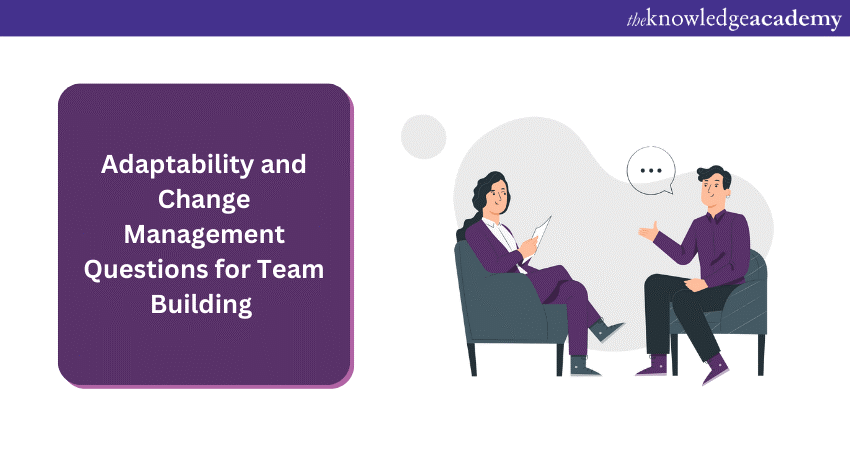
1) How do you adapt to changes within your team?
Ans: Adapting to changes within a team can involve maintaining flexibility, fostering open communication, and viewing change as an opportunity for growth.
2) How do you help your team adapt to changes?
Ans: Helping a team adapt to changes can involve clear communication about the changes, providing support and resources, and encouraging a positive outlook towards change.
3)How do you handle uncertainty within your team?
Ans: Handling uncertainty within a team can involve promoting open communication, providing reassurance, and encouraging a proactive approach to addressing challenges.
4) How do you manage change within your team?
Ans: Managing change within a team involves clear communication, providing support, and promoting adaptability and flexibility.
5) What strategies do you use to encourage adaptability within your team?
Ans: Encouraging adaptability within a team can involve promoting a growth mindset, fostering resilience, and creating an environment that values flexibility and innovation.
6) How do you support a team member who is struggling with change?
Ans: Supporting a team member who is struggling with change can involve understanding their concerns, providing reassurance, and offering resources and support.
7) How do you handle a change in leadership within your team?
Ans: Handling a change in leadership within a team involves promoting open communication, facilitating a smooth transition, and providing support to team members during the change.
8) How do you manage a team through a significant organisational change?
Ans: Managing a team through a significant organisational change involves clear communication, fostering resilience and adaptability, and providing support and resources for coping with change.
9) How do you promote resilience within your team?
Ans: Promoting resilience within a team can involve encouraging a growth mindset, providing resources for handling stress and adversity, and fostering a supportive and understanding team environment.
10) How do you help your team stay focused during periods of change?
Ans: Helping a team stay focused during periods of change involves maintaining clear communication, reiterating team goals and objectives, and providing support and reassurance.
Maximise your productivity and master your time- Register now in our Productivity And Time Management Course.
11) How do you manage risk within your team?
Ans: Managing risk within a team can involve proactive planning, promoting a culture of risk awareness, and encouraging a balanced approach to risk-taking.
12) How do you balance stability and change within your team?
Ans: Balancing stability and change within a team involves maintaining core team values. This also involves processes while promoting flexibility and adaptability in response to changing circumstances.
Additional Interview Questions for Team Building
We have got a good idea now of how to face problem-solving Team Building Questions. We have provided you with some more additional Team Building Interview Questions so that you are prepared to face any interview. Let’s have a look:
1) How do you handle disagreements within your team?
Ans: Open dialogue and collaborative problem-solving can effectively handle disagreements within a team.
2) What team-building activities do you suggest during challenging projects?
Ans: Informal Team Building activities can be organised to build team spirit during challenging projects.
3) How do you handle a team member who is not contributing adequately?
Ans: A team member not ontributing adequately can be addressed through a private discussion to understand any issues they're facing and how they can be supported.
4) How do you motivate a team member who is demotivated?
Ans: A demotivated team member can be motivated through guidance, support, reassurance, and encouraging them to express any concerns or difficulties.
5) What role does every team member play in project success?
Ans: Project success often relies on the unique skills and input of individual team members.
6) How do you manage a team member who is not pulling their weight?
Ans: A team member not pulling their weight can be addressed directly and respectfully, reminding them of the importance of their role within the team.
7) How do you handle situations where your team is facing a critical problem?
Ans: Brainstorming sessions can lead to solutions for critical problems, enabling teams to meet their project deadlines.
8) How do you keep team morale high?
Ans: Regular check-ins, positive reinforcement, and celebrating team and individual achievements can keep team morale high.
9) How do you foster collaboration within your team?
Ans: Collaboration within a team can be fostered through open communication, respect for diverse perspectives, and collective decision-making.
10) How do you handle team communication?
Ans: To handle team communication, transparent and timely communication is important. Encouragement for all team members helps them to express their ideas and concerns. This can effectively handle team communication.
11) How do you handle a situation where a team member disagrees with an idea?
Ans: Constructive discussions can help understand the viewpoint of a team member who disagrees with certain ideas.
12) How do you handle a situation where you have to complete a project in half the time originally planned?
Ans: A tight deadline can be managed by prioritising tasks and addressing them effectively. This ensures that communication lines are always open.

Conclusion
Building and maintaining a strong, productive team requires understanding, communication, and the ability to navigate the complexities of interpersonal relationships. As these Team Building Questions illustrate, it opens spaces for you to showcase your true abilities and skills. These questions on Team Building also allow you to embrace both challenges and successes as opportunities for growth.
Unleash your full potential and drive organisational growth with our Personal & Organisational Development Course.
Upcoming Business Skills Resources Batches & Dates
Date
 Team Development Training
Team Development Training
Fri 4th Apr 2025
Fri 6th Jun 2025
Fri 8th Aug 2025
Fri 3rd Oct 2025
Fri 5th Dec 2025






 Top Rated Course
Top Rated Course


 If you wish to make any changes to your course, please
If you wish to make any changes to your course, please


